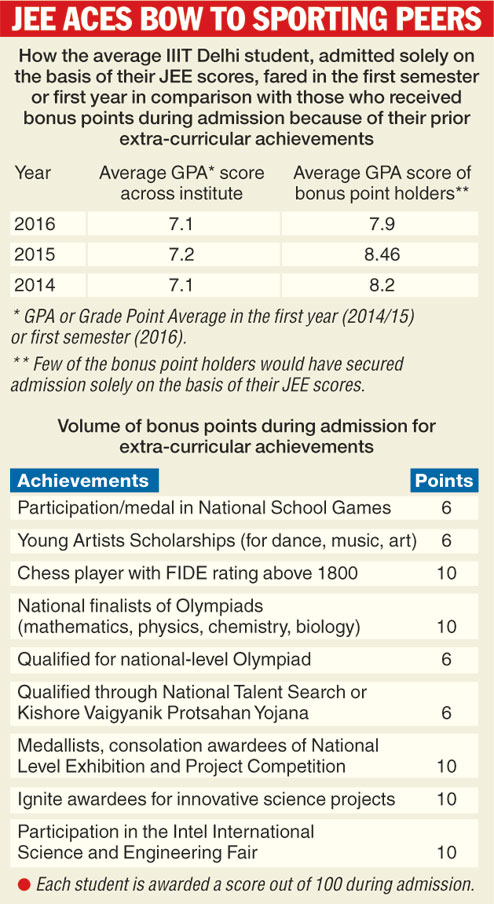New Delhi, Jan. 23: A wider interest in sports, arts, music or scientific pursuits may better equip a student academically than a narrow focus on coaching and exams, even if he happens to be an engineering student, a study seems to suggest.
The Indraprastha Institute of Information Technology (IIIT) Delhi has reached this conclusion by comparing the first year or first semester performances of its own students.
It has found that those who gained admission largely with the help of bonus points awarded for previous extra-curricular activities tended to outshine the rest, who had made it solely on the basis of their JEE Main scores.

It's no secret that JEE success often owes heavily to months of rigorous coaching that leaves little time for relaxation, let alone other pursuits or hobbies. Those who gained the bonus points, though, had clearly invested enough time on sports, the performing arts or science competitions and projects.
Their JEE scores were generally lower than their peers' - hardly a tenth of them would have cut it without the bonus marks - but they seemed to come into their own once the admission pressure ended and the learning began.
Dheeraj Sanghi, dean (academics and international relations) at the Delhi government-run institute, noted that the mean Grade Point Average of the students who secured bonus points was about one whole point higher than the institute-wide average.
"Students who had excelled in games, the arts, and science projects and competitions seem to acquire a higher possibility of success in any life situation than those narrowly focused too early in life," Sanghi said.
No break-up of the performance of students who had excelled in sports and the arts, as opposed to those who did so in science competitions and projects, was available.
Ashok Ganguly, former chairman of the Central Board of Secondary Education (CBSE), which conducts the JEE Main, said the findings raised questions about the content of the entrance exam.
He said the findings implied that the students cracking the JEE didn't necessarily have an aptitude for the study of engineering.
"This means the JEE is not testing the candidates' aptitude. Those receiving thorough coaching are scoring well," he said.
Ganguly suggested that other educational institutions follow IIIT Delhi's model of admission.
Sanghi said that just as JNU awarded additional points to compensate candidates from deprived sections or backward regions, "we compensate students who have invested time in some additional activities beyond their routine studies".
IIT-BHU director Rajeev Sanghal said the Indian Institute of Information Technology, Hyderabad, too awarded extra marks to seat seekers who had earned national scholarships and awards.
"A holistic development is essential. Students with high motivation need to be encouraged; that's why this admission policy is much better," Sanghal said.
Kiran Mehta, principal of Salwan Public School, Delhi, welcomed the findings. She argued that the Continuous and Comprehensive Evaluation system, introduced in CBSE schools seven years ago but now under review, too widened a schoolchild's horizon.
"A focus solely on studies is not what schooling should aim at. To be better prepared in life, a child must take part in extra-curricular activities, projects and competitions," Mehta said.
Of the 270 students that IIIT Delhi admitted this year, 32 had earned bonus points. Twenty-six had been awarded bonus points in 2015 and 16 in 2014.
Up to 10 bonus points are added to seat seekers' overall score out of 100 depending on the category of extra-curricular activity they have excelled in and, sometimes, the degree of their excellence in it.
One of the categories, the National Talent Search, tests students' mental ability and language and mathematics skills, while the Kishore Vaigyanik Protsahan Yojana tests his understanding of science.
In the National Level Exhibition and Project Competition, students of Classes VI to X are tested on science projects. The National Innovation Foundation hands out the Ignite Awards for innovative technological ideas.
The Young Artistes Scholarships are awarded by the government in areas of music, dance, theatre, puppetry, literary art, graphics, sculpture and painting.










